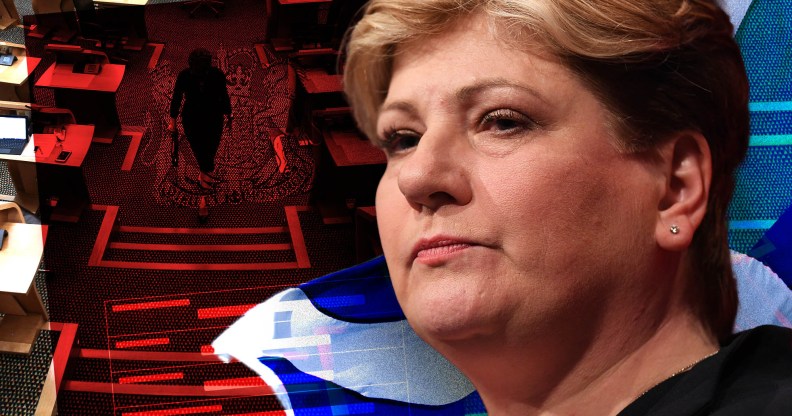Labour MP Emily Thornberry explains why she didn’t vote against Scottish gender bill block

Labour MP and staunch LGBTQ+ ally Emily Thornberry was notable in her absence during the vote on blocking Scotland’s gender recognition reforms. (Getty/PinkNews)
Labour’s shadow attorney general and longtime LGBTQ+ ally Emily Thornberry has explained why she abstained from a vote to stop the Tory government from blocking Scotland’s historic gender reform bill.
The Gender Recognition Reform (Scotland) bill was passed by Holyrood in December by 86-39 votes and years of public consultation in a bid to simplify the process for a trans person to gain legal recognition of their gender.
But on Tuesday (17 January), after weeks of debate and toxic headlines in the right-wing press, the Tory government’s Scottish secretary Alister Jack made the unprecedented move to block the bill from gaining royal ascent by enacting Section 35 of the Scotland Act.
Jack announced the move in the House of Commons before a divisive debate on the issue – including a “disgusting” speech from Tory MP Miriam Cates in which she linked trans people to predators – and a vote by MPs. While an overwhelming majority of Tory MPs voted to back the block, the Labour Party was notable by its absence – with leader Keir Starmer ordering his MPs to abstain.
Eleven Labour MPs rebelled and voted against the Tory motion – including queer politicians Nadia Whittome, Kate Osborne and Lloyd Russell-Moyle – but many voters have questioned why staunch allies like Thornberry did not do the same.
Why did Emily Thornberry abstain from voting to block the Tories from triggering Section 35?
Emily Thornberry – a longtime campaigner for LGBTQ+ rights, a vocal ally to the community and an incredible supportive sister to her gay bother – took to Twitter to condemn the vote as “parliamentary theatre” between the Tories and the SNP.
“It was just parliamentary theatre,” she wrote. “[It] did nothing to enlighten, empower nor inform”.
The MP for Islington South and Finsbury also said that discussions around legal gender recognition shouldn’t be reduced to a “culture war” for Scottish independence.
“We should have the vulnerable, marginalised trans community at the forefront of our minds when discussing the Gender Recognition Act and not using it as an opportunity to fight culture wars or for Scottish independence,” Thornberry said.
The move sparked reactions from supporters online, with some criticising Thornberry – and other Labour MPs – for not voting.
One person wrote: “If its parliamentary theatre I feel it would have been more beneficial to put your opposition on paper, because now there are a great many LGBTQ+ people in the community feeling betrayed by Labour abstaining in this vote.”
Another person wrote: “This is a dreadful cop out, Emily. You’re a politician – you know optics matter! In the clip above you rightly refer to the appalling media climate for vulnerable trans people – and yet, when given the chance to send a clear, unequivocal message of support, you don’t.”
This week Thornberry echoed Kier Starmer’s view that 16 is too young for a person to change their legal gender, but agrees the near 20-year-old UK Gender Recognition Act needs a modern update.
“I think we do need to update the gender recognition act… it has some pretty inhumane sections in it, but I think it needs to be subject to a bit more consultation than we’ve had,” she said.
“As Kier said at the weekend, we’re concerned about there being a hard cut-off at 16, that suddenly you’re an adult at 16. We think time between 16 and 18 is more nuanced.”
How did this story make you feel?

